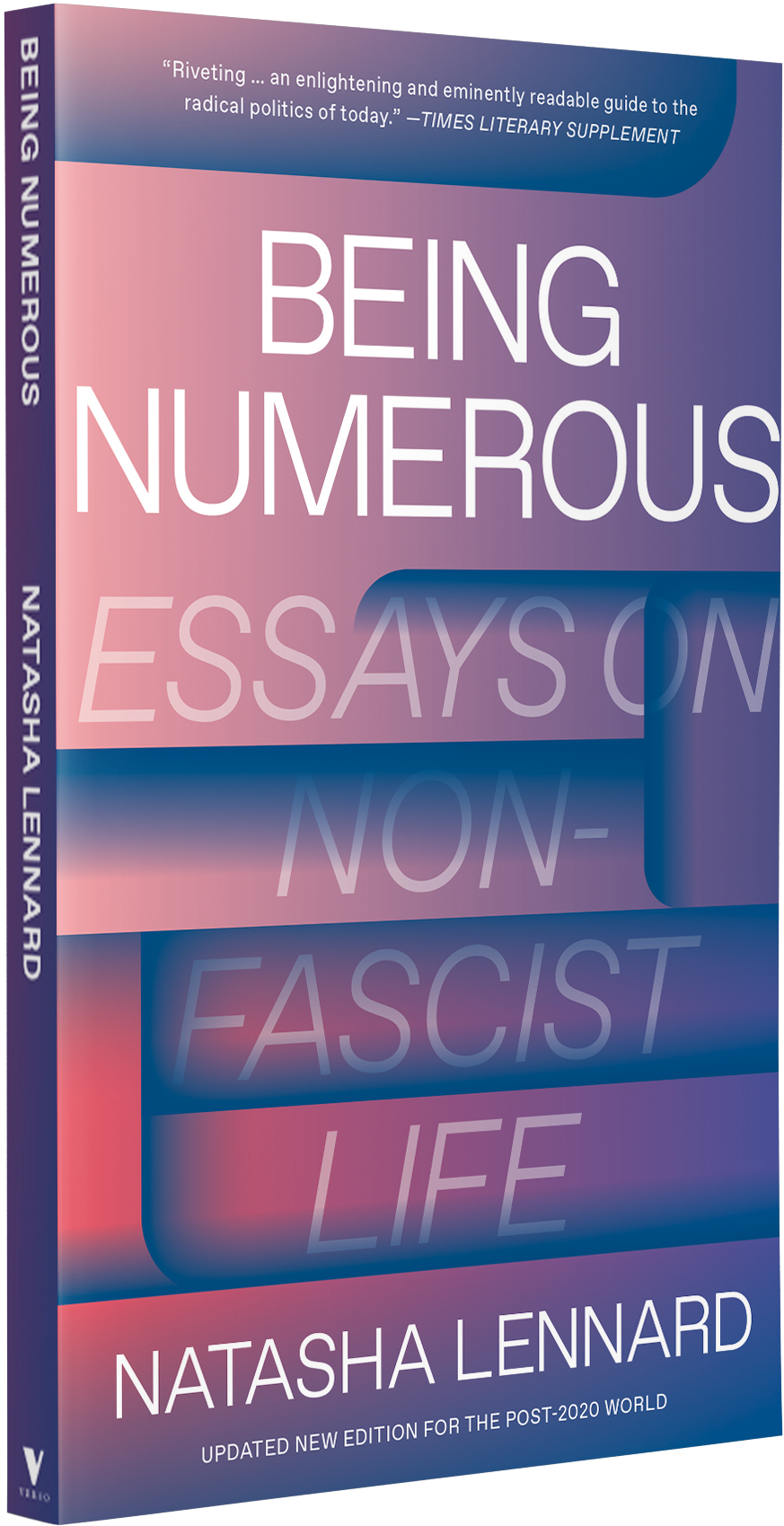Being Numerous:
Essays on Non-Fascist Life
April 2019
An urgent challenge to the prevailing moral order from one of the freshest, most compelling voices in radical politics today Being Numerous shatters the mainstream consensus on politics and personhood, offering in its place a bracing analysis of a perilous world and how we should live in it. Beginning with an interrogation of what it means to fight fascism, Natasha Lennard explores the limits of individual rights, the criminalization of political dissent, the myths of radical sex, and the ghosts in our lives. At once politically committed and philosophically capacious, Being Numerous is a revaluation of the idea that the personal is political, and situates as the central question of our time —How can we live a non-fascist life?
“Pulsating with energy and acuity, Being Numerous tackles urgent, fundamental questions: What are the sources of our oppression? Do we want to be free? While assessing the forces aligned against our collective liberation (some of which are inside our heads), Natasha Lennard never loses hope. An inoculation against apathy and nostalgia, this is an essential, provocative collection for our confounding times.”
– Astra Taylor, director of What Is Democracy?
“Compassionate and merciless, Natasha Lennard’s writing is proof that moral philosophy must not be left to the mealymouthed centrists whom the discipline seems to incubate like eggs. Centrism, fascism’s PR department, emerges as the true antagonist of this scrappy collection, and Lennard punches it right in the face. Being Numerous is a manual for how to be kinder by being crueler.”
– Andrea Long Chu, author of Females: A Concern
“Natasha Lennard is one of the most brilliant and compelling thinkers of our time. She breaks binaries and uproots ideology in elegant prose. Being Numerous demands the attention of any and all who feel the urgency to build the next world.”
– Mychal Denzel Smith, author of Invisible Man, Got the Whole World Watching
“Natasha Lennard views politics through the lens of theory, and writes theory with passion and fire—her essays on suicide, violence, sex and antifascism are the work of a dazzling intellect grappling with the most pressing issues of our time.”
– Molly Crabapple, author of Drawing Blood
“I am always thrilled to read work by Natasha Lennard. Her combination of theory and hard reporting is as rare as it is essential. Questions about liberalism and anti-fascism that dominate our political moment are tackled here with theoretical sophistication, serious reporting, and an inimitable style.”
– Sarah Leonard, coeditor of The Future We Want: Radical Ideas for the New Century
“Natasha Lennard’s lucid writing about militant social struggles from the inside is in some sense the simplest thing: these are the contemporary forms of what people have long done against intolerable conditions and intransigent powers. And yet engagement with them is so disallowed in the present that Lennard’s fidelity to investigation and insight feels hard-won, heroic, and deeply honorable. This is committed journalism at its finest: forbidden, formidable, ferocious.”
– Joshua Clover, author of Riot. Strike. Riot: The New Era of Uprisings
Violence: Humans in Dark Times
April 2018
Through a series of penetrating conversations originally published in the New York Times and the Los Angeles Review of Books, Brad Evans and Natasha Lennard talk with a wide range of cutting edge thinkers–including Oliver Stone, Simon Critchley, and Elaine Scarry–to explore the problem of violence in everyday life, politics, culture, media, language, memory, and the environment. To bring out the best of us, writes Evans, we have to confront the worst of what humans are capable of doing to one another. In short, there is a need to confront the intolerable realities of violence in this world.
In Violence, Brad Evans and Natasha Lennard have created, alongside their interview subjects, a kaleidoscopic exploration of the concept of violence, in terrains expected and not, in prose taut and unexpectedly gorgeous. Their philosophical rigor provides the reader with an intellectual arsenal against the violence of the current moment.
– Molly Crabapple, author of Drawing Blood
The purpose of the work is to challenge humanity to create more meaningful solutions when it comes to these kinds of violence–or at least to name violence without inadvertently inciting even more anger. . . . passion roars through every chapter . . . This book delivers on what it promises, which is an achievement.
– Alison Gately, The Los Angeles Review of Books
If you wish to read the intellectualization of violence, Violence is a phenomenal anthology. . . . Brad Evans and Natasha Lennard, the interviewers and the ‘authors’ of the anthology, have done a remarkable job in bringing together perceptive and intelligent contributors from various fields to scout the reaches of violence. Their piercing questions brought out brilliant responses from the interviewees.
– L. Ali Khan, New York Journal of Books
The range of interviews with leading academics, to filmmakers and artists, is impressive, at once immediate and relevant, but also profoundly philosophical. More essentially, though, the conversations underline the need and suggest ways to resist and organize in a visionary way, in the extraordinary times we live in.
– Razia Iqbal, BBC News

